"Sexual and Reproductive Health for Adolescents and Youth: Opening New Horizons and Fulfilling Potential".
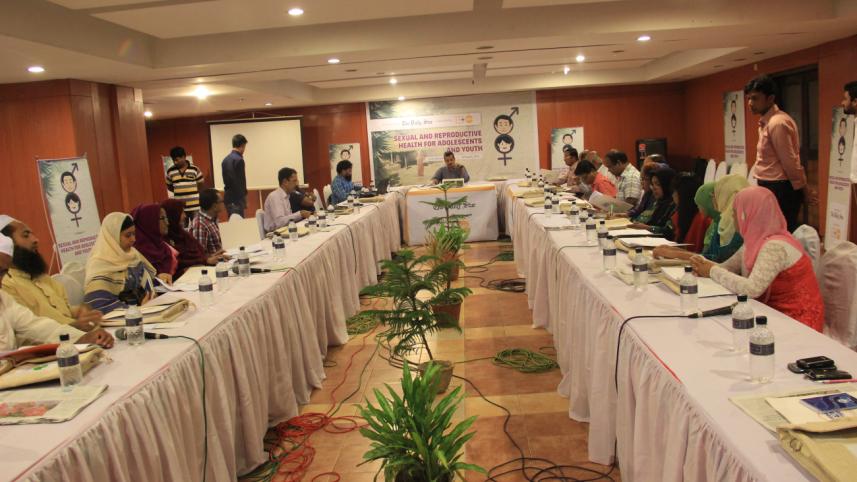
RECOMMENDATIONS
| *Boys and girls should feel free to discuss with their parents and elders about the changes in their bodies and mind they experience during puberty. | *The issues of rape and unsafe abortions need to be addressed as they are linked to high maternal mortality. | *Adibashi (aborigine) communities need to be trained on remarriage registration system. |
| *Young boys need information, health services, education, empowerment and work. | *Teachers should teach topics on some issues such as experiencing the first menstruation and hygiene practices during this time as given in the textbooks. | *Information on nutrition information, cleanliness and service centres should be included in the curriculum. |
| *Education should be given a higher priority rather than marriage, for young girls. | *All schools should have proper toilets with water and soap, separately for boys and girls. | *Attention to the psychological problems of the adolescents is necessary.
|
On the 22nd of August, The Daily Star and the United Nations Population Fund (UNFPA) jointly organized a roundtable at the Warison
Hotel & Restaurant in Rajshahi. The title of the roundtable was "Sexual and Reproductive Health for Adolescents and Youth: Opening New Horizons and Fulfilling Potential". Participants of the roundtable included district health officials, district government officials, health researchers, law enforcing agencies, policy makers, students and well known civil society members. Chief guest was Md. Nizam Ul Azim; Mayor (in charge) of Rajshahi.
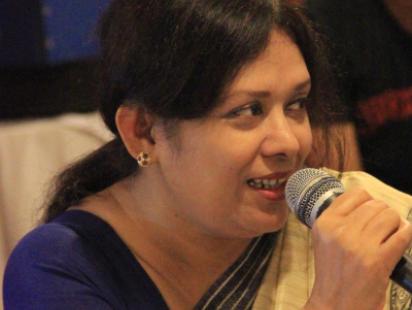
At the invitation of the moderator Jamil Ahmed, Dr. Muhammad Munir Hussain, National Programme Officer, Adolescent and Youth Unit, UNFPA presented the keynote paper.
With reference to the Sustainable Goals set for Bangladesh, Dr. Munir Hussain highlighted and emphasized some of the targets and discussed the private sector's role in the development of the youth through investment in quality education and making it compulsory for all upto the twelfth grade. He also talked about revising the curriculum so that it reflects the requirements of a modern society and the inclusion of comprehensive sexuality education.
Dr. Munir Hussain pointed out that there are approximately 52 million young people in Bangladesh and that adolescent birth rate here is the highest in the South Asian region. Unemployment rate for youth is 7.5% (LFS 2010). And child marriage is a serious concern at all levels.
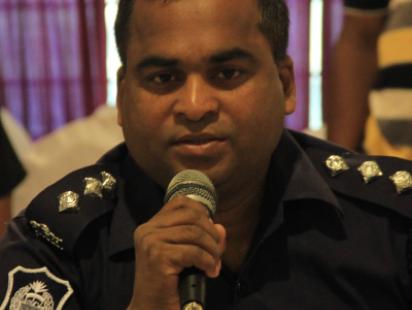
Talking about the Sustainable Development Goals set for Bangladesh he discussed some important goals like ensuring healthy lives, ending the epidemics of AIDS, tuberculosis, malaria, combating hepatitis, water-borne diseases and other communicable diseases; ensuring universal access to sexual and reproductive health-care services, including family planning services; achieving gender equality and empowering women and girls; ensuring universal access to sexual and reproductive health and reproductive rights as agreed in accordance with the Programme of Action of the International Conference on Population and Development and the Beijing Platform for Action and the outcome documents of their review conferences; ending hunger, achieving food security.
While talking about Advocacy for Youth Development he laid emphasis on access to quality health services; provision of quality health services to all, including sexual and reproductive health, especially for female youth; increasing access to the basket of family planning services in low performing and hard-to-reach areas; promoting the utilization of maternal and child health services in rural and urban slum settings; providing sexual and reproductive health information and services to unmarried youth.
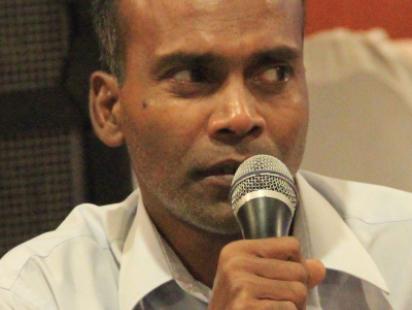
Dr. Munir Hussain talked about reducing the incidence of pregnancies of those below 18 years and unplanned pregnancies; budgetary allocation to address youth issues; provision of quality sexual and reproductive health services regardless of marital status.
He further talked about engaging the Private Sector in youth development; investing in quality education through making education compulsory upto 12 years; revising the curriculum to reflect requirements of modern society; incorporating Comprehensive Sexuality Education in educational/training institutes; implementing UNESCO's recommendation of minimum 6% of the GDP for education
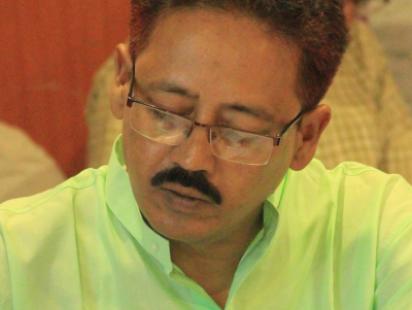
Md. Nizam Ul Azim had a lot to share with the participants. He pointed out that most of us are not concerned about the general well being, such as education, health etc., of the young girls who live in our neighborhood yet the moment news of an under-aged girl getting married reaches us we jump into action and start to speak out against it. In order to address these issues at the root, the government needs the support of the community people in general and also that of the media to make a difference. To tackle the issue of child marriage it has to be ensured first that all girls go to school and they are aware of what it means to reach puberty. The Mayor pointed out that young girls panic when they experience their first menstruation as they have no clue what is happening to them let alone how to take care of themselves and maintain hygiene. Sometimes they cannot even talk to their mothers out of shyness. But patents should be friendly and explain things in their true perspective. He also added that the current price at which sanitary napkins were being sold is not affordable for most rural girls therefore prices need to be lowered. Family members should also play an integral role in imparting knowledge among young children about health and hygiene issues.
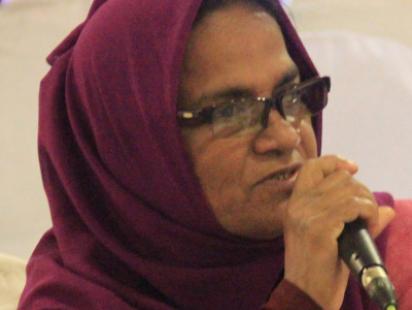
The Mayor said that issues of health and hygiene need to be discussed elaborately through including them in school textbooks.
Md. Ataul Gani, Additional District Commissioner (Revenue) of Rajshahi mentioned that works regarding creating awareness about the bad effects of Child Marriage are noticeable. Magistrates are now more gender sensitive as are law enforcers who now know more about the existing laws regarding child marriage.
Engineer Md. Khaled Hossain who is the Chief Instructor at Rajshahi Polytechnic said that most schools do not have proper toilets with water and soap. There are no separate toilets for girls. Young boys and girls need to know these things properly but we cannot give them the information. Some topics are given in the book of class VI but teachers avoid teaching them.
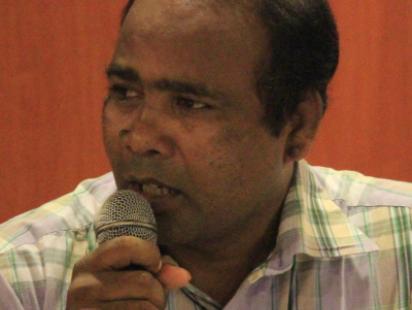
Rajkumar Shaon, an adibashi (aborigine), said that there is no system of registration of marriage in their community as a result girls are married off at very young age. He wants marriage registration to be made mandatory in their community.
Maksuda Parveen Priya, a psychologist, said that both boys and girls suffer from physical and psychological insecurity at this age. She said that three things are important during adolescence: Nutrition information, cleanliness and service centres. These should be included in the curriculum and their psychological problems should be given attention to at this age. She suggested opening counseling service in each school.
Adv. Yasmin Ara Juli, chief of Bangladesh Mahila Ainjibi Parishad, identified two major problems of the youths - namely, hygiene and nutrition. She said that intervention has to start from the schools, for example, check how hygienic the school toilets are.
Dr. Nasim Akhtar, Deputy Director, Family Planning office Rajshahi, informed that they are working with a small group of adolescents who usually suffer from identity crisis. Therefore they are giving more emphasis on counseling.
Shumon Hasan of Radio Hope believes that media has a bigger role in disseminating health information. There is dearth of programs on health awareness.
Faria Islam of Rajshahi University suggested that adolescents should be made aware of social norms and values. They should have clear understanding of good parenting and be able to discuss their problems freely with their parents.
Young participant Mohammadullah thinks young people's biggest problem is that they cannot share their secrets with anyone.



 For all latest news, follow The Daily Star's Google News channel.
For all latest news, follow The Daily Star's Google News channel.
Comments